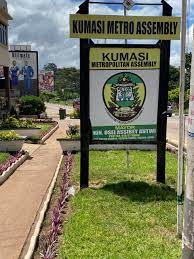Over 120 lavatories are expected to be handed over to public basic schools in the Kumasi Metropolitan Assembly (KMA) by November this year.
In a 2017 report conducted by the Ghana Education Service (GES), it was indicated that more than 7,400 public basic schools out of the over 20,000 in Ghana lack toilet facilities. Out of this number (7400), nearly 1,500 schools in the Ashanti region lack toilet facilities.
To resolve this issue, some 120 toilet facilities have been built for basic schools in the Kumasi Metropolis under the Greater Kumasi Metropolitan Area - Sanitation and Water Project (GKMA SWP).
The facilities are awaiting commissioning.
The project coordinator of the GKMA SWP, George Asiedu affirmed in an interview that the initiative is aimed at improving access to toilet facilities in the over 1,000 public primary schools in the region.
Mr Aseidu told JoyNews, “A number of the schools in Ghana do not have access to improved toilet facilities and if we are to achieve SDG-6, we need to ensure that everyone living anywhere has access to improved toilet facilities.
“In Kumasi, we are about to hand over all the 129 facilities. We are almost at the point of handing over; all of them will be finished by November 2023,” the project coordinator further assured.
Additionally, he stated that the new facilities are gender- and disability-friendly, allowing all persons to utilise them comfortably and easily.
“Our facility, we describe it as gender and disability friendly, so within the facility, we have a girl-child changing room; when the girls, at the end of the month have their menses, they should be able to have access to a facility that they can conveniently change themselves and clean themselves... And then we’ve made provision for the physically challenged,” Mr Aseidu said.
The Ministry of Sanitation and Water Resources also hosted a three-day stakeholder forum with school management committees and Parent-Teacher Associations across the Metropolis to ensure the sustainability and upkeep of the facilities.
The Programme Manager at the Ministry, Charlotte Agyei highlighted some adverse impacts on the education of students in basic schools should the various stakeholders fail to support the ministry in ensuring a good maintenance culture for the facilities that are expected to be handed over.
“If they (female students) don’t have toilet facilities in their schools, during the five days that they are menstruating, they will not come to school. So it defeats the purpose of girls' education and girls empowerment.
“And if we have the facilities and we are not able to maintain it to stand the lifetime of the facility, then it becomes a challenge for the school,” Madam Agyei noted.
Latest Stories
-
Rwanda plan: Irish government wants to send asylum seekers back to UK
16 mins -
Ice cubes now cost more than bread and milk in parts of Mali
2 hours -
Titanic gold pocket watch sells for £900,000
3 hours -
Elon Musk in China to discuss enabling full self driving – reports
3 hours -
Foreign Affairs Ministry advises against travelling to Northern Mali
3 hours -
After dating him for three years, I proposed to my husband
3 hours -
Beatrice ‘Bee’ Arthur tackles plastic pollution through artistic exploration
4 hours -
Hundreds turn out for Luv FM/Telecel Fitness Walk in Kumasi
4 hours -
Ghana Post launches Asantehene Commemorative Stamp
4 hours -
Police fire tear gas to disperse Benin wage protest
4 hours -
Airline keeps mistaking 101-year-old woman for baby
4 hours -
Harvey Weinstein hospitalised after conviction overturned
4 hours -
Anis Hafar: Learning how to avoid wars
4 hours -
Private legal practitioner wins Akan NPP parliamentary candidate poll
5 hours -
American-Israeli hostage appears in Hamas video for first time
5 hours

